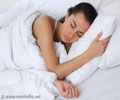Sleep disorders patients adopt maladaptive coping strategies that contribute to reduced sleep quality.

‘Insomnia is a very common problem that has major economic and social costs, in addition to adverse health effects. When patients seek help for sleep problems, it's generally from a primary care provider, such as a family physician or nurse practitioner.’





Unintended consequences of coping strategies contribute to sleep problems The pilot study included 137 patients seen at a sleep clinic from 2017 to 2019 for problems such as obstructive sleep apnea or insomnia. "Having worked in a sleep practice for several years I noticed many of my patients had issues with insomnia based on their habits," says Dr. Winegar. Based on patient questionnaires, she analyzed rates of certain types of maladaptive coping strategies and how they affected the results of sleep laboratory testing (polysomnography), which provides specialists with detailed information on sleep architecture.
Consistent with previous insomnia studies, most of the patients had adopted one or more counterproductive strategies to address their sleep problems:
Caffeine. About two-thirds of patients reported using caffeine. Although often used as an energy boost by those who feel sleepy during the day, caffeine can lead to increased problems with nighttime sleep.
Sleep aids. Nearly half of patients (47%) took prescription sleep medications, while another 19% used over-the-counter (OTC) sleep aids. More than 40% of patients reported using herbal products, indicating that they were "self-medicating" for their sleep problems.
Advertisement
These maladaptive coping strategies affected sleep quality in several ways. Patients who did not use sleep aids entered the critical rapid eye movement (REM) phase of sleep faster than those taking prescription sleep medications: 131 versus 167 minutes. Patients using prescription sleep medications also had fewer REM cycles than those on OTC sleep aids or no sleep aids.
Advertisement
Patients who used caffeine had longer times to REM sleep – except for those who had more than two servings of caffeine per day. Patients who took regular naps had less daytime sleepiness but longer sleep latency times, compared to those who didn't take naps.
"Learning about good sleep hygiene and making some slight changes to their routines – going to bed at the same time, turning off the television and lights when in bed – can help patients to sleep better without the use of sleep aids," says Dr. Winegar.
She advises patients with insomnia or other sleep problems to create new habits to "prioritize sleep." "Always plan for eight-hours of sleep nightly," Dr. Winegar adds. "Do not nap. Keep the same sleep hygiene routine and sleep schedule on all days."
Sleep Awareness Week® is the National Sleep Foundation's national public education campaign that celebrates sleep health and encourages the public to prioritize sleep to improve health and well-being. Becoming aware of and avoiding the unintended consequences of maladaptive coping strategies supports that mission of learning about the benefits of optimal sleep and how sleep affects health, well-being, and safety.
Source-Eurekalert















